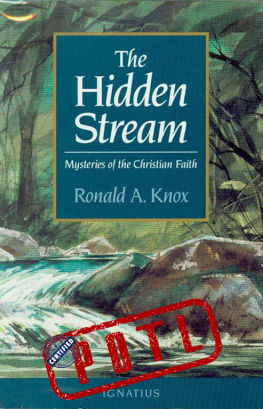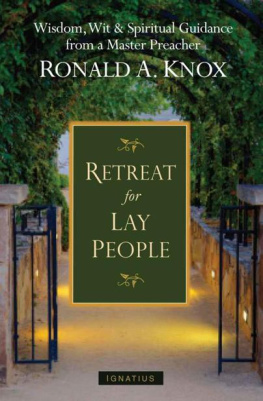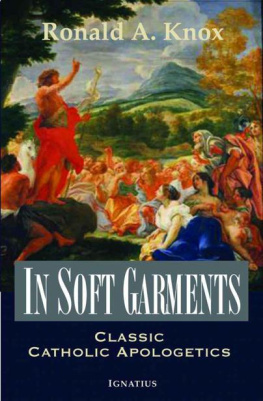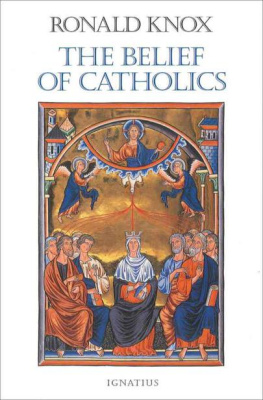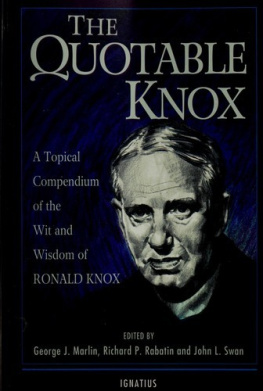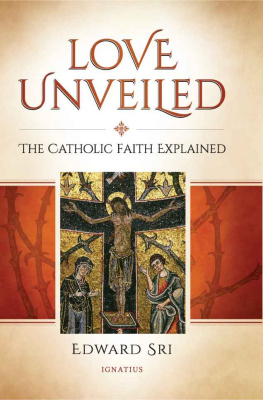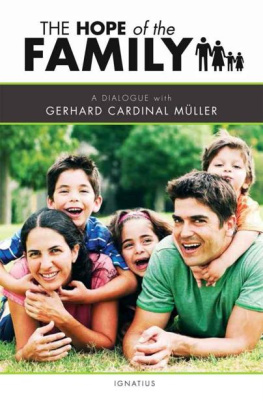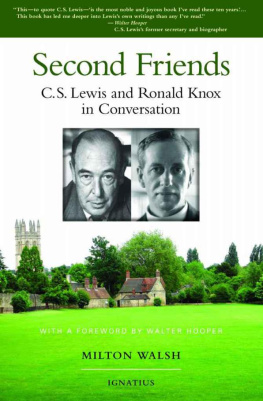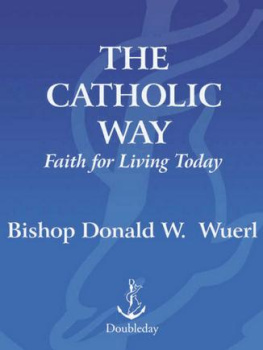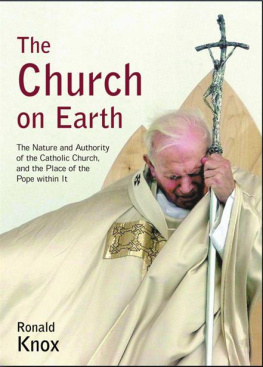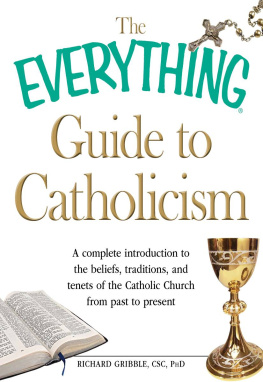THE HIDDEN STREAM
RONALD A. KNOX

IGNATIUS PRESS SAN FRANCISCO
Original edition published 1953 by Sheed & Ward
Copyright by the Earl of Oxford and Asquith
Published with ecclesiastical permission
New edition printed by permission of The Earl of Oxford andAsquith, care of A. P. Watt Limited
Cover by Christopher J. Pelicano
Reprinted 2003 Ignatius Press, San Francisco
All rights reserved ISBN 0-89870-863-x
Library of Congress Control Number 2002105234
Printed in the United States of America
CONTENTS
PREFACE
Itis ten years now since I published In Soft Garments, a selection of the conferences I had given to the Catholic undergraduates atOxford while I was their chaplain. The same course of apologetics still goeson; and, since my resignation, the kindness of my successors has made a pointof my coming back, once every term, to take part in it. The result is that mystore of back-numbers is full to bursting again, and calls for a freshsalvage-drive. Here, then, is a new set of conferences, which inevitably coversthe same sort of ground, or even the same ground, as the old; wherefundamentals of the faith are concerned, a fresh generation of undergraduatesis exercised by the same problems as the last. But the treatment, in these newessays, is differentwhether for better or worse, it is not for me to say; Ionly know that, for the most part, they were more laboriously written.
It remains to give some explanation ofthe title I have chosen. The lane which runs past the Old Palace (where theseconferences were delivered) bears every mark of being a closed-in water-course,and so indeed it is; here the Trill Mill Stream, a true branch of Isis that hasflowed modestly through the less frequented parts of Oxford, goes undergroundfor a few hundred yards, to issue under an ornamental bridge in the ChristChurch Memorial Garden. If you know the right turning, close by the gas-works,you may thrust your canoe up to the mill-pool under the Castle walls, where anentrance hardly more dignified than that of a sewer invites you to leave thenoise of Oxford behind, and float down through the darkness.
Fivecenturies ago, before the mill-stream was covered in, it must have hurried pastthe walls of the Franciscan, then of the Dominican friary, accepting itstribute of grey cowls and black competitively washed. Those rivalries havevanished; invisible, now, it burrows its way under the discreet postern ofCampion Hall, the pious uproar of the Old Palace. But it is the same channel,and a true water-course; not all of Isis flows under Folly Bridge or meandersabout the shoals of the Seacourt Stream. And (if I must drag my parable to thelight) not all the philosophies of Oxford are philosophies of negation anddespair; she is fed by secret streams, not less influential to her life or lessnative to her genius.
[1953]
What Is Religion?
Stevenson,I think in Virginibus Puerisque, has preserved for us a letter written to aman by his aunt, on the subject of a young lady who would, she thought, be agood person for this nephew of hers to marry. And she goes through a list of thevarious talents and accomplishments the young lady has, mentioning amongothers, "about as much religion as my William likes". I think in anydiscussion of religion it is important to rule out that idea of itfrom the first. It is not a kind of accomplishment, like painting on china, ofwhich it is important that the debutante should have a smattering soas to increase her value in the matrimonial market. It is fair to mention thatI think "my William" is a rather common figure in the non-Catholicworld; he rather prefers it if the girl he wants to marry is mildly religiousin that sort of way; and it is our fault if we let that idea of what religionmeans become current. It is because we practise religion in a rather languid,external way that people get the impression it is a sort of bloom on thesurface of our lives which makes us more attractive people; a sort of addedgrace of character which some people have, some haven't. Whatever else itislet us be clear about that from the outsetreligion is something we belongto, not something which belongs to us; something that has got hold of us, notsomething we have got hold of. It is something which determines our wholeapproach and our whole relation to life; if it is not that, if it is to be amere fad or a mere pose, it had better be cut out altogether.
That you can see even from itsderivation. I don't think there can be any real doubt that it is derived fromthe Latin verb religare, to bind, to tie down. I don't apologize for inflictingLatin verbs on you, because in a curious way you can say that religion is botha Latin word and a Latin thing, whereas theology is a Greek word and a Greekthing. The Greeks liked to talk about the gods, bring them into speeches andlend a tone to literature with them, but they didn't like doing anything about them; they lived by their philosophy, if they lived by any ruleat all. Whereas the Romans, till they began to go Greek, were for ever worryingabout taboos and ceremonies and omens; they lived a life haunted by the unseen,and they were always trying to dodge the implications of it. Above all,religion meant that if you swore an oath you had got to keep it; it bound you.That predominating sense has survived in modern ecclesiastical language. Whenwe talk about monks or nuns as "religious" what we are saying is notthat they are holier people than ourselves, though no doubt they usually areholier people than ourselves. What we are saying is that they are bound byvows, and we are not. They can't go out and get drunk even if they want to.
When we have said that, we have saidenough to make ourselves feel that religion is a rather unpleasant thing. Inthe first place because it seems to be no better, at least in its origins, thana kind of magic. And in the second place because it is something merelynegative; it is a drag upon one's life, not an inspiration to live by. Let ustake those two objections in that order.
I think I am right in saying that it isbad anthropology to regard magic as the ancestor of religion. It would be truerto say that magic is the ancestor of science. The medical man of to-day comesdown to us from the medicine man of centuries ago; but the centuries have beencenturies of trial and error, so he knows his stuff better. The business of thescientist, as of the magician, is first to discover the causes of things andthen to avoid their effects. He is trying to exploit man's surroundings in theinterests of man. But religion, you see, is just the other way up; its object,if you can put the thing as crudely as that, is to exploit man in the interestof his surroundings. The magician tries to see how much he can get out of Godfor man; the priest tries to see how much he can get out of man for God. Ofcourse, in any primitive society the two things are always getting mixed up,and it isn't easy to say where religion begins and magic ends. In setting outto make amends to the god you have somehow offended, you are also trying to getrid of the drought or the cholera which he has sent to punish you. But in ideathe two things are separate.
And not only are they separate in idea,but they develop as time goes on in opposite directions. Magic thins out intoscientific research; tabooism thins out into a religion of personal holiness.One pedigree ends in Rutherford, the other in Gandhi. Science gets more andmore externalized; drops the spells and the incantations, sticks to the lancetand the pills. Religion gets more and more internalized, comes to regard theaction of worshipping the image as less important than the attitude of theworshipper towards his god, the lustral water as less important than purity oflife.
Next page
